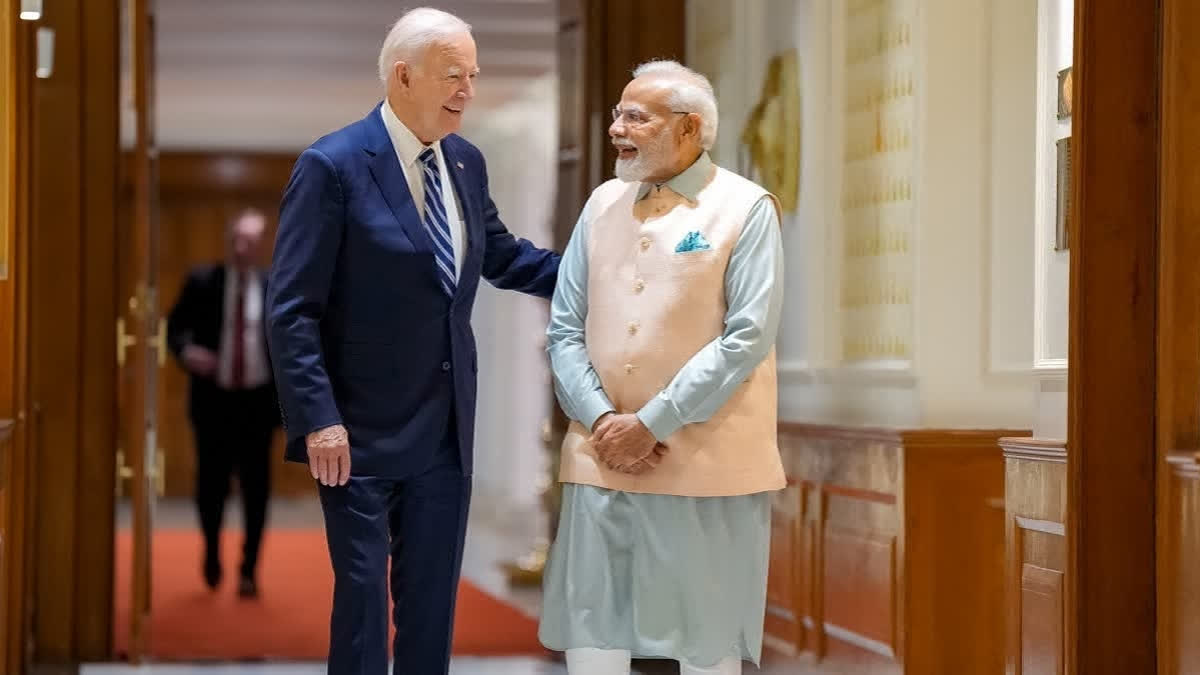Hyderabad: China launched the Border Road Initiative (BRI), its major economic infrastructure, in 2013, to have its economic footprints sprawled out across the member countries. India is not part of the BRI. Before China would celebrate its 10th anniversary, the G20 nations agreed to and subsequently announced India Middle East Europe Economic Coridor (IMEEEC), which is going to connect India with West Asia and Europe respectively, through ships and rail links.
The US, West Asia, and the European Union countries came to an agreement on this corridor during two days of the Summit in New Delhi that the trade route which will connect India with Europe via Saudi Arabia for speedy and hassle-free trade. This agreement is going to counterweight China’s BRI and also undermine the geopolitical and strategic significance of Pakistan in the region. The natural and historically critical land route for India to connect to central Asia used to pass via Pakistan, which neither Pakistan nor India could explore. The partition and ongoing hostilities made these natural trade routes unprofitable and redundant for the trade between India, Central Asia and beyond.
Now that Asia and Europe are going to get connected economically through IMEEEC, Pakistan would be completely irrelevant to India in the region except for a few contentious issues between them including Kashmir. China’s BRI project in Pakistan, CPEC (China Pakistan Economic Corridor), is having difficulties since many of the provinces it goes through like Gilgit Baltistan and the separatists in Balochistan are staunch opponents of the project. The problems this project faces in the country will only bring bitterness between Pakistan and China in future.
Now that an alternate route for India is in the offing; Pakistan, China and their small-time allies would try to find a way to stall the project. Saudi Arabia is a significant stakeholder in the India-Middle East Corridor and has long been Pakistan’s friend, infact seeds of the trade route were sown in Riyadh when security advisers of the US, Saudi, UAE and India met during NSA level talks out there in the country. Therefore, the chances of influencing Saudi to sabotage the project are bleak. The involvement of Israel might possibly have posed an issue had the US already not brokered a deal between Saudi and Israel, and only after that the deal was stamped in New Delhi. The corridor would majorly have shipping, railway connections and is going to minimise the travel time between India and other trading countries by more than 35 percent. Although the proper layout is not yet public, there will be undersea ducts for seamless flow of energy, electricity and cables connecting countries digitally. A detailed plan is expected in the coming months.
This is going to benefit India big way as the country was struggling for a long time to connect with central Asia through Chahabar port. India wanted to build a rail link between Chahabar and Zahedan to bypass Pakistan to have connectivity with central Asia which was, apparently, stalled by China on the behest of Pakistan. The US also didn't want it to happen due to its hostilities with Iran. Chahabar is India’s port in Sistan-Balochistan province of Iran. Now that G20 countries have agreed to have a trade route between India, Saudi Arabia, UAE, Europe and Israel, all partner nations will benefit from it. The rain link of the IMEEEC will have electric and energy pipelines going along the route and will ensure energy security for the nations contributing to the deal.
This economic corridor will counterweight BRI and will break China’s monopoly. The economic corridor will involve also the countries that are fed up with China’s expansionist approach. India represents a potential alternative to China in the region is what the West looks at it.
The economic corridor has brought a massive change in the perspective and countries unhappy with China are overwhelmed. Italian Prime Minister Giorgia Meloni, during her visit to India to attend the G20 summit hinted at withdrawing from China’s BRI after she committed to be part of the North Corridor connecting India with Europe via the East Port of Saudi Arabia. African Union becoming part of G20 and looking at India as a leader of the Global South will be a major pain point for China given its hegemonic approach towards weaker nations.
Given the upcoming elections in both India and the US, the economic corridor is likely going to make some buzz for the leaders as an achievement. Unlike Trump, Biden remained under fire for failing to make any significant headway in the Israel conflict, which only endangered his standing among the Jewish lobby in international circles. The former US President, Donald J. Trump established US diplomatic mission in Jerusalem during his tenure. It generated a huge welfare for Trump among pro-Jewish lobbies.
Now that both countries- Saudi and Israel - will be a part of the economic corridor and that the US-mediated agreement between them would help put an end to the Israeli-Arab conflict and as a result, Saudi may recognize Israel. In the upcoming elections next year, it will be interesting to see if this deal translates into a vote bank for both Biden and Modi respectively.



